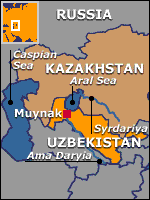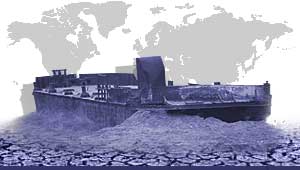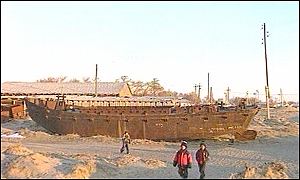|
|
|
|
..
By BBC's Paul Welsh in Uzbekistan Forty years ago, Muynak was a busy fishing port where the waters of the Aral Sea lapped up against the shoreline. Today the waters have receded so much, that there is not a drop as far as the eye can see. When the former Soviet Union diverted the Ama Dariya and the Syrdariya - the rivers which fed the Aral Sea - to grow cotton in the desert, they created an ecological and human disaster. You need to take to the air to appreciate the scale of the damage that has been done.  What was the
fourth biggest inland sea is now mostly desert.
What appears to be snow on the seabed is really
salt. The winds blow this
as far as the Himalayas. An analyst from the
organisation set up by five
countries nearest the old sea told me that by
changing farming methods,
they have slowed down the rate of shrinking.
Still, it will be years yet before what is left of the sea begins to grow again. All of this was done in the name of cotton - grown where it would not grow naturally. The Soviet Union developed huge plantations here. It remains the main source of income for the newly independent republics.
Change is difficult, but change they must. Miles from the Aral Sea, the ground is encrusted with salt. Decades of heavy irrigation have raised the water table and brought all the salts the soil held to the surface. Disease is rife The human misery is huge. One victim has tuberculosis, which is rife and on the increase in the rest of the population. Cancers, lung disease and infant mortality are 30 times higher than they used to be because the drinking water is heavily polluted with salt, cotton fertilisers and pesticides. Rim Abdulovich Giniyatullin of the International Agency for the Aral Sea Program hopes that the rest of the world can learn lessons from the Aral Sea tragedy. "Don't allow the misuse of water," he warns. "Be careful about how much you use, and stop before the source starts to shrink." The Utegenova family lives in Muynak. One of them works - but only part-time. Jobs and food died with the sea. The Utegenovas are constantly hungry and sick. Their tea is salty because of the contaminated water. It killed their father who died 10 years ago of cancer of the oesophagus, a common complaint here. Zulayho, who is pregnant, goes for more water. Like 80% of expectant mothers, she is probably anaemic. She knows that if her child survives, it will almost certainly be ill. "I know the water is not good. If my children get ill, I take them to the doctors," she explains. "But whatever the doctor does the children don't get well again - because they still have to drink this water." The Red Cross and Red Crescent have begun to bring food to the most destitute. Rice, flour and oil supplement a meagre diet. These organisations are only able to help 10% of those living below the poverty line in a poor country. Nina Nobel of the Red Cross says that she hopes it will help to reduce some diseases. "Particularly tuberculosis," she says. "The immune system becomes weakened due to poor nutrition. People become very vulnerable. You have these big extended families living in very poor conditions right now and the tuberculosis spreads very quickly." Bleak future The children of Muynak have made a playground out of the wrecks of ships which might have provided food and a future for them. As I walked with Togian Ibragimova, Muynak's deputy mayor, through the ship graveyard, the rusting remains of their fishing fleet, she expressed the concern that no one would ever learn from what has happened to the Aral Sea and its people. "It could happen again," she explains. "No one looked scientifically at what changing farming methods here would do. It could easily happen again and again. Human beings can be very stupid." Some 3000 miles from here in The Hague, the World Water Forum will endeavour to change Ms Ibragimova's bleak vision of the future for millions worldwide. |
|
| FAIR USE NOTICE: This page contains copyrighted material the use of which has not been specifically authorized by the copyright owner. Pegasus Research Consortium distributes this material without profit to those who have expressed a prior interest in receiving the included information for research and educational purposes. We believe this constitutes a fair use of any such copyrighted material as provided for in 17 U.S.C § 107. If you wish to use copyrighted material from this site for purposes of your own that go beyond fair use, you must obtain permission from the copyright owner. | |
|
|


